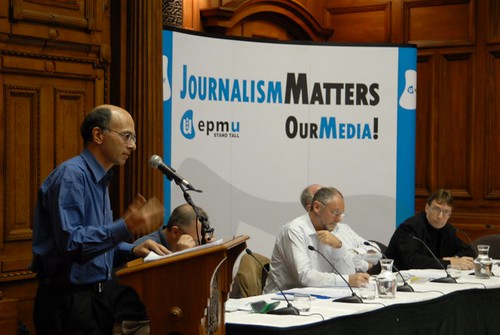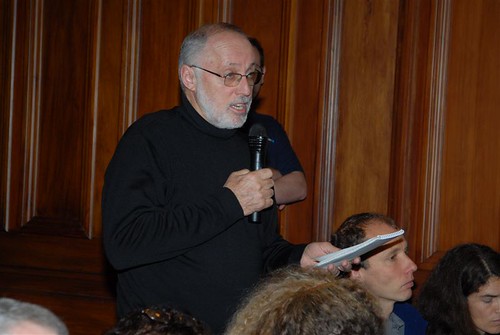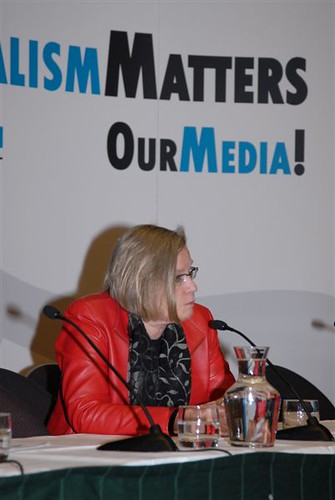
Over the past weekend 11-12 August I was in NZ's very own "windy city", the capital Wellington for a conference hosted by the EPMU, which has the journalists' union tucked up inside it. EPMU stands for Electrical, Print and Manufacturing Union and the journos ended up there after a series of amalgamations forced on the trade union movement by the neo-liberal policies of successive New Zealand governments.
The journos' union is not in great shape. It appears that membership is falling and that 'density' the ratio of unionised to non-unionised workers in any newsroom is also low.
But the conference itself was interesting. At the end of the first morning I was asked to sum up the day so far. Here's a copy of my notes:
Citizen. Journalist.
We're all agreed that a well-functioning media is a critical element to a functioning democracy. However, I think we should start by putting an emphatic full-stop between the words Citizen. and Journalist.
All journalists are citizens, but the question today is: "Are all citizens journalists?"
Clearly the answer is not yet.
This raised the issue of filtered versus non-filtered news. It also suggests the combination "citizen-hyphen-journalist" and the attendant quality issues.
I'd prefer to talk about "DIY", do-it-yourself journalism, but is it really journalism?
Then there's the link between "celebrity" and journalism. There's journalism about celebrities (perhaps a dumbing down of the news agenda) and there's "celebrity-hyphen-journalist". This is the situation where the personality of the journalist (mainly in TV, but also in blogging and columns) takes over.
Convergence and new technologies
What will the journalists of the future do? More importantly, who are they?
There was considerable discussion of digital convergence and the issues of cross-platform journalism. Is it the case that in the future, if reporters are required to work across platforms that they risk becoming competent in video/audio/photography and writing, but not really masters of any discipline.
Workloads associated with repurposing copy also raised issues, particularly in the context of the low wages and poor conditions "enjoyed" by working journos in New Zealand. One student from Massey even pointed out that she earns more as a waitress in a Wellington restaurant than she will in a newsroom after four years of study.
the key issue for me is that we shouldn't get too hung up about platforms. Convergence is not going to go away and in the scheme of things the "digital revolution" may yet have some way to go. If it's anything like the industrial revolution, it go on for another couple of generations, at least.
In that context the important thing to remember about journalism is that the key intellectual skills of a journalist - the ability to "record", "disclose", "remember" and "entertain" will not go away either. I believe that journalists are quotidian intellectuals. They are the public intellectuals of the everyday. Their job is to do more than merely report, there is a role for interpretation, analysis and critical thinking.
Demography
Is the changing face of New Zealand represented in the media? The short answer is no. Most journalists are from fairly priviledged white, middle class backgrounds, but New Zealand's population is changing. Maori and Pasifika populations are growing and so is the "Asian" community. I always feel uncomfortable talking about the "Asian" community in such broad terms. It's made up of many different national and ethnic groups and they each deserve recognition. Chinese, Korean, Thai, Vietnamese, Laotian, Burmese, Japanese, Indian (Sikhs, Hindus, Tamils, Pakistanis, Sri Lankans, Muslims and Christians).
Journalism schools are also struggling with this population shift.

At AUT University we're trying to increase our appeal in non-white communities, with, so far, limited success, but we're working on it. According to JTO (Journalists Training Organisation) figures there is still a large gap between the general demographic profile of New Zealand and the graduates from the j schools.
[Photo right: Jim Tucker of the JTO]
There's also an age issue in terms of the NZ demographic picture. People under 25 generally don't read newspapers, while those over 50 do. This is certainly having an impact on both the commercial and the content side of the news in print and broadcasting. Which led me, in a round-about way to talking about political economy.
Political Economy of News Everyone seemed concerned about the impact of globalisation on the New Zealand news industry. New Zealand has one of the most concentrated and foreign-dominated media industries in the world. This work by Bill Rosenberg spells it out quite clearly. There are some good tables and figures in Bill's work.
 There was a sentiment that globalisation leads to a homogenisation of the news agenda and an element of "dumbing down" the news to lowest common denominators.
There was a sentiment that globalisation leads to a homogenisation of the news agenda and an element of "dumbing down" the news to lowest common denominators.
A key issue then, is can good journalism coexist with corporate ownership. As Judy McGregor pointed out, this is an important fault line in the media. It cannot necessarily be solved by changes and reforms, such as cross-media ownership laws.
[Photo right: Keynote speaker, Dr Judy McGregor]
Wages and conditions
All that really needs to be said is that they are bad and getting worse. It was good that Rick Neville from APN and several executives from Fairfax were there to hear this, but we're yet to see if it will make any difference. Frankly, without some kind of mega industrial campaign that is absolutely illegal under NZ industrial law, this is not likely to change.
However, several speakers, including Chris Warren of the Australian journos' union, the MEAA, made the point that the quality of news must also be an industrial issue. Certainly this was strongly expressed during an afternoon session on media ethics. The collective action of organised labour is a key strategic weapon of the unions. At least it should be.
The union needs to do lots of work to improve its coverage and its clout in New Zealand newsrooms.
Finally we talked about the public-union interface and the need for some kind of real public and political campaign. Hopefully this is about to begin. AUT journalism school is hosting a meeting in Auckland on 22 August to launch a campaign committee.
More on that later














No comments:
Post a Comment